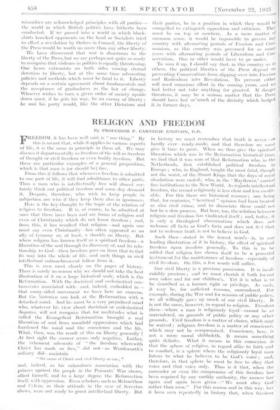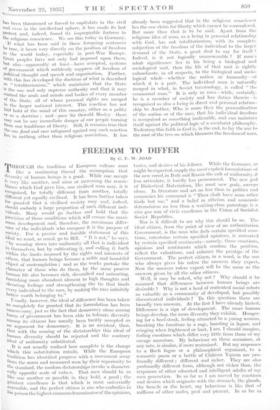RELIGION AND FREEDOM
By PROFESSOR P. CARNEGIE SIMPSON, D.D.
FREEDOM, it has been well said, is " one thing." By this is meant that, while it applies to various aspects of life, it is the same in principle in them all. We may discuss it departmentally as freedom of the will oi• freedom of thought or civil freedom or even bodily freedom. But these are particular examples of a general proposition, which is that man is (or should be) free.
From this it follows that whenever freedom is admitted to one part of life, it will lied admittance to other parts. Thus a man who is intellectually free will almost cer- tainly think out political freedom and some day demand it. Despots, therefore, who wish to keep people in subjection are wise if they keep them also in ignorance. Here is the key-thought to the topic of the relation of religion to freedom. It is, of course, to be admitted at once that there have been and are forms of religion and even of Christianity which do not know freedom ; and, from this, it has resulted that religion—and again one must say even Christianity—has often appeared as an ally of tyranny or, at least, a shackle on liberty. But where religion has known- itself as a spiritual freedom--a liberation of the soul through its discovery of, and its rela- tionship to God—then freedom goes on from that to find its way into the whole of life, and such timings as civil intellectual enfranchisement follow from it.
This is seen most clearly On the pages of history. There is surely no reason why we should not take the best illustration of it on a large historical scale, which is the Reformation. With the doctrinal and ecclesiastical con- troversies associated with—and, indeed, embedded in-- that many-sided movement we have here no concern. But the historian can look at the Reformation with a detached mind. And his must be a very prejudiced mind who, whatever his view about doctrinal, or ecclesiastical disputes, will not recognise that for multitudes what is called the Evangelical Reformation broUght a real liberation of soul from manifold oppreSsions which had burdened the mind and the conscience and the life. What, then, was, the result of this on liberty generally ? At first sight the answer seems only negative. Luther, the vehement advocate of " the freedom wherewith Christ has made us free," did not—as Wordsworth's solitary did—maintain " the cause of Christ and civil liberty as one ; " and, indeed, as his calamitous association with the princes against the people in the Peasants' War shows,. allied himself, and. to• a, large degree the Reformation, itself, with oppression. Even scholars, such as Melancthon and Calvin, as their attitude in the ease of Scryetus. shows, were not ready to grant intellectual liberty. But in history we must remember that truth is never—or hardly ever—ready-made, and that therefore we must give it time to grow. When we thus give the spiritual liberation which was in the Reformation historical time, we find that it was sons of that Reformation who, in the Netherlands, first established political freedom ill Europe ; who, in England, taught the most fatal, though not the worst, of the Stuart Kings that the days of royal absolutism were ended; who, in the a Mayflower,'. carried free institutions to the New World. As regards intellectual freedom, the record religiously is less clear and less credit- able. For this there arc historical reasons ; one being that, for centuries, " heretical " opinion had been treated as also civil crime, and to dissociate these could not but be a slow process. But here, too, the relation betwecu religion and freedom has vindicated itself ; and, today, it is only a theological obscurantism which does not welcome all facts as God's facts and does not feel that not to welcome truth is not to believe in God.
Such then—stated in the fewest words—is, in one leading illustration of it in history, the effect of spiritual freedom upon freedom generally. To this is to be added that religion has shown itself to be a powerful instrument for the maintenance of freedom—especially of civil freedom. On this, a few words will suffice.
Our civil liberty is a precious -possession. It is incal- culably precious ; and we must cherish it both for our own sakes and for our children's. Yet it is what is to be described as a human right or privilege. As such, it may be, for sufficient reasons, surrendered. For example, during the War and for reasons of public policy., we all willingly gave up much of our civil liberty. It is not the same, however, in regard to religion. Freedom there—where a man is religiously loyal—cannot be surrendered, on grounds of public policy or any other grounds. Civil freedom is a matter of choice, which may be waived ; 'religious freedom is a matter of conscience, which may not be compromised. Conscience, here, is' not .a mere moral shibboleth. It means something quite definite. What it means in this connexion is: that the sphere of religion, in regard alike to faith and to conduct, is a sphere where the religiously loyal man. listens to what he believes to be God's voice ; and, therefore, in that sphere he must be free to obey that voice and that voice only. Thus is it that, when the surrender or even the compromise of this freedom has' been, required by any earthly authority, the answer has again and again been given—" We must obey God' rather than men." For this reason and in this way, has it been seen repeatedly in history that, when freedom has been threatened or forced to capitulate in the civil aud even in the intellectual sphere, it has made its last Protest and, indeed, found its impregnable fortress in the religious conscience. We see this today in Germany. • If what has been said in these foregoing sentences be true, it bears very directly on the position of freedom In the world today, especially in post-War Europe. Great peoples have not only had imposed upon them, hut also—apparently at least--have accepted, systems Of government which ruthlessly suppress all freedom of Political thought and speech and organisation. Further, With this has developed the doctrine of what is described as " totalitarianism," which maintains that the State Is the one and only supreme authority and that it may control the souls and minds and bodies of every member Of the State, all of whose personal rights are merged In the larger national interest. This reaction has not laid hold of the mind of this country, either as a polity or as a doctrine ; and—pate Sir Oswald Mosley—there may not be any immediate danger of our people turning front our traditions of liberty. Still; it remains true that the One final and sure safeguard against any such reaction in nothing other than religious conviction. It has already been suggested that in the religious conscience lies the one claim for liberty which cannot be surrendered. But more than that is to be said. Apart from the religious idea of man, as a being in personal relationship with God, has not totalitarianism, with its complete subjection of the freedom of the individual to the larger demand of the State, a great deal to say for itself ? Indeed, is it not logically Unanswerable ? If man's whole significance lies in his being a biological and sociological unit, then the life of that unit is rightly subordinate, in all respects, to the biological and- socio- logical whole --whether the nation or humanity-Of which it is a part. The individual man is naturally merged in what, in Soviet terminology, is called " the communal man." It is Only as man--while, certainly, he is a member of society and has duties therein- is recognised as also a being in direct and personal relation- ship to Another, Who is more than the personification of the nation or of the race, that his individual freedom is recognised as something inalienable, and can maintain itself against the political logic of a secularist philosophy. To destroy this faith in God is, in the end, to lay the axe to the root of the tree on which blossoms the freedom of man,































































































 Previous page
Previous page